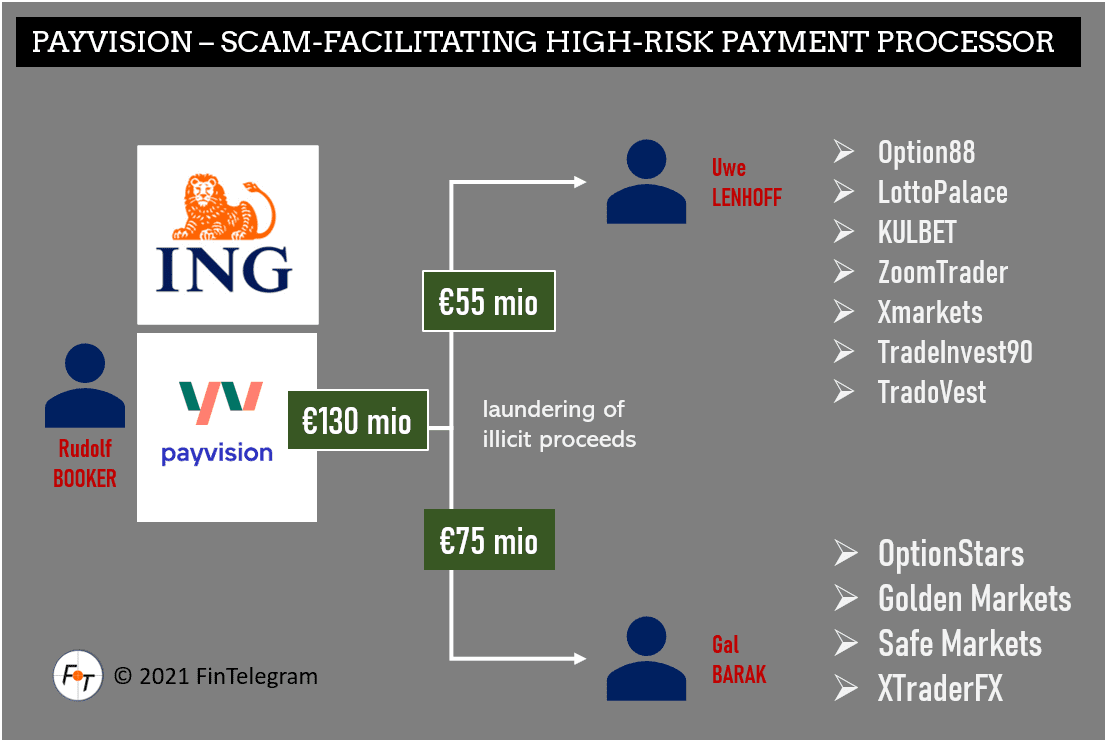Oh yes, the alleged German cybercrime mastermind Uwe Lenhoff was a very good acquaintance of Payvision founder and CEO Rudolf Booker. They spent skiing vacations together in Austria and communicated intensively. Thanks to the frequent and very open communication between Lenhoff and Booker, their business details can be found in the criminal files. Lenhoff was arrested in January 2019 after months of investigation by authorities in several EU countries. He was accused of being the mastermind of a cybercrime organization that runs scams and organizes money laundering. Lenhoff was one of the partners of Israeli Gal Barak who was also arrested. Fortunately for some of his co-conspirators, Lenhoff was found dead in his prison cell in Germany in early July 2020 before the trial could have taken place. Cause of death: unknown.
This article is part of FinTelegram’s new “High-Risk Payment Processors Report.“
Let’s kill FinTelegram
Communications between Uwe Lenhoff and Rudolf Booker demonstrate that the latter and his Payvision knew very well that Lenhoff was involved in criminal activity. Besides, financial market regulators from various regulatory regimes issued multiple warnings against Lenhoff’s business. Booker expressed concern about the increasing publicity. He also expressed concern that FinTelegram reported on Lenhoff’s and Payvision‘s activities. Lenhoff said he would take care of FinTelegram and the publisher. In fact, Lenhoff allegedly placed a kill order with the Serbian Mafia to kill the editor of FinTelegram.
Sure Payvision knew
The court files of Uwe Lenhoff and his partner Gal Barak prove beyond any reasonable doubt the involvement of Payvision, in its capacity as a high-risk payment processor, in the two’s criminal activities. Dozens of millions of Euros were laundered between at least 2015 and 2019, and Payvision made good money in the process. This boosted the company’s valuation, and Booker was able to sell his Payvision to ING for more than €300 million in 2017/18. Bravo. But wait a minute! There’s more!
The stolen forfeited Millions
In the criminal file of Gal Barak – who is currently serving a four-year prison sentence in Austria after his conviction – there is exciting documentation regarding the cooperation with Payvision. Law enforcement agents have seized extensive WhatsApp and Telegram chats. In them, for example, one can find communications of Gal Barak and his accomplices from January 2019. Shortly before the arrest of Barak. Numerous documents show that Payvision has retained or forfeited more than €2.6 million of illegal proceeds.

Allegedly because of expected chargebacks (CB). Barak would have facilitated the release of these millions in talks with Booker; he writes to his people via Telegram. In fact, Barak was arrested a few days after that, and Payvision might not have made the millions’ payout. In the communication, we read that Payvision already knew about defrauded customers’ complaints and the CB and RR since 2017. And even had to pay hundreds of thousands of euros in fines to the credit card networks. Rudolf Booker and Payvision apparently did not mind as long as the millions were flowing increasing profits and company valuation.
EFRI Campaign as reference case
One thing is certain in the fight against cybercrime: strict action must be taken against evil payment processors. This includes making bad payment processors and their business practices known. But it also includes holding payment processors and their people legally responsible and making restitution to victims.
The European Fund Recovery Initiative (EFRI), a non-profit organization registered in Vienna, represents numerous victims of Gal Barak and is now taking action against Payvision. It wants to achieve that Payvision fully compensates the victims of Gal Barak. EFRI and its lawyers see Payvision as co-conspirators and the company and its directors – in particular Rudolf Booker – criminally and civilly liable. The Vienna Cybercrime Trials (#VCT) and the respective court ruling supports this legal opinion and vindicates the claims. It will be an interesting precedent – civilly and criminally.
